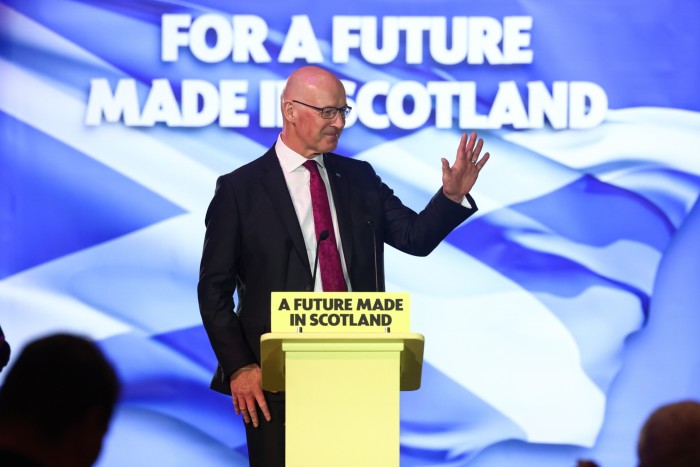Revival in SNP fortunes raises fresh questions about Scottish independence

Unlock the Editor’s Digest for free
Roula Khalaf, Editor of the FT, selects her favourite stories in this weekly newsletter.
Almost six months after the Scottish National party’s heavy defeat in the UK general election, polls suggest its fortunes are already reviving as sentiment cools towards Sir Keir Starmer’s Labour government. A recent poll also found 54 per cent support for Scottish independence — the SNP’s defining goal — the highest level in four years.
“The UK Labour government hasn’t set the heather alight,” said Ian Blackford, former SNP leader at Westminster. “The key question is whether people are going to feel better off at the end of this parliament, and it doesn’t look that way.”
First minister and SNP leader John Swinney has argued, since taking the top job in May, that to build support for independence his party has to deliver on core voter issues, and show how they could be advanced by breaking away from Westminster.
This so-called gradualist approach has become a rallying cry among many SNP members, encouraged by Swinney’s centrist pivot away from the more radical policies of former first minister Nicola Sturgeon. Delivering on the priorities of “normal people”, they believe, is a prerequisite for raising the baseline of 45-50 per cent support for independence towards the 60 per cent level needed to secure a referendum win.
“The SNP must demonstrate that it’s worthy of the people’s trust,” said Blackford. “There are three priorities — health, education and housing.”

That won’t be easy, given the SNP has already been in power in Scotland’s devolved government for 17 years, with troubled legacies in public services, from healthcare to transport. There is also the outstanding police inquiry into the SNP’s finances which saw Sturgeon — who has denied any wrongdoing — arrested and her husband, Peter Murrell, charged with fraud.
But UK chancellor Rachel Reeves’ record funding settlement for Scotland has allowed the SNP to spray cash into higher benefit payments, the NHS and housing.
Shona Robison, Scotland’s finance secretary, also diverged from Labour by protecting pensioners’ winter fuel payments and pledging to end the two-child benefit cap from the next financial year — just ahead of the 2026 Holyrood elections in May.

Yet the SNP’s revival under Swinney still does not illuminate a clear pathway to independence, given both the Tory and Labour governments rejected the idea of another referendum.
In the decade since 55 per cent of Scottish residents voted against leaving the UK, debates on how to secure independence have bogged down the fractured movement, with the SNP breaking up its parliamentary coalition with the Scottish Greens and ongoing bad blood with Alba, the breakaway party of the late former first minister Alex Salmond.
“Any future campaign will seek a broad coalition with other parties and the grassroots, but real challenges remain around unresolved strategy — it’s a faultline always under the surface that could re-emerge,” said Tom Montgomery of Stirling University. The pro-independence movement “is still just muddling through, rather than having a clear strategy”.
Alba calls for a more proactive approach. “You must have a mechanism, a strategy, to get there — that is where the SNP is failing,” said Ash Regan, the party’s sole MSP.
Her party has called for the regional list vote at next year’s Holyrood elections to act as a de facto independence referendum. The “additional member system” is based on two separate votes per person — one for each constituency and another for a regional list of parties calculated proportionately.
That would allow pro-independence Labour voters, who Regan estimates make up as much as 30 per cent of the party’s base, to use their second vote to signal support for exiting the UK.
“We would use that as the democratic authority for independence and then go down to negotiate — we wouldn’t necessarily need a referendum,” she said.
Starmer would have no choice but to accept the will of Scotland, she said. “I think Starmer is a democrat,” she added.
While support for independence has hovered around 50 per cent, many unionists believe that the nationalist proposition would not stand up to scrutiny from an inquiring electorate during a campaign — whether for a referendum or parliamentary polls touted as a de facto referendum.
“Independence as an abstract and distant concept is much more popular than painful details,” said Sam Taylor of These Islands, a pro-union group.
The SNP government has failed to answer “really thorny questions” about the fiscal plan, which currency to use and how to manage the border, among others.
In a referendum, the leave side would still need to persuade voters that Scotland, which like other devolved nations currently receives more per capita in public money than England, would be better off as an independent state. As well as uncertainty over whether to use sterling or to launch its own currency, leaving would create regulatory friction at the border with the rest of the UK, Scotland’s largest trading partner.
But Taylor added that the pro-union should not be complacent. “Scottish nationalism is currently not going anywhere, but it is not going away.”
#Revival #SNP #fortunes #raises #fresh #questions #Scottish #independence




